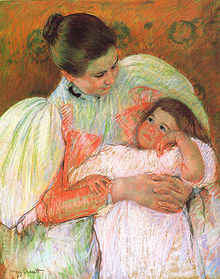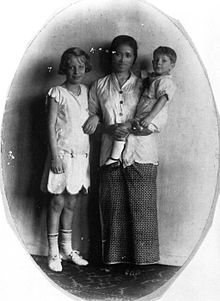- Nanny
-
For other uses, see Nanny (disambiguation).
Caring for children At home Parents · Extended family
Au pair · Babysitting
Governess · NannyOutside the home Day care · Pre-school playgroup Educational settings Early childhood education
Preschool · Nursery school
Pre-kindergarten · KindergartenInstitutions and standards Child protection
In loco parentis · Minor (law)Related Child abuse · Family law
Orphanage · Parenting A baboe and the children in her care in colonial Indonesia. 1934
A baboe and the children in her care in colonial Indonesia. 1934
A nanny, childminder or child care provider, is an individual who provides care for one or more children in a family as a service. Traditional nannies were servants in large households and reported directly to the lady of the house while modern nannies, like other domestic workers, may live in or out of the house depending on their circumstances and those of their employers. Professional nannies are usually certified in cardiopulmonary resuscitation, fluent in First Aid, and have a degree or extensive training in child development. There are many employment agencies that specialize in childcare and online services that aid in finding available nannies.
A childminder cares for the child in the childminder's home. A governess, in contrast to a nanny, concentrates on teaching and training children.
Contents
History
In the 19th and early 20th century, the position was usually known as a "nurse", and was, as for many childcare jobs, invariably female. In a great house, the nurse ran her own domain, a suite of rooms called the nursery, supported by at least one assistant, known as a nursemaid (or nurserymaid). Because of their rôle in child care, nannies were somewhat more indulged than junior servants. Nannies may have remained in the employment of the same aristocratic family for years, looking after successive generations of children.
Colonial era
Nannies were present in the households of the European colonial empires throughout the world. It was a characteristic feature of colonial society that the children of European administrative officers were entrusted to the care of native women.
Nannies in colonial times spent their lives in the home of their masters, often from childhood till old age, taking care of more than one generation, depending from the duration of the post. It was not uncommon for these nannies to be brought along with the family away from their native country when officers were posted somewhere else.
- In the British Raj nannies were known as ayah, after aia, nurse, governess (Portuguese). This term is presently part of the vocabulary of various languages of the Subcontinent, meaning also female servant or maid.
- In the Dutch East Indies the household nanny was known as baboe.
Nannies
Although many families use the modern version of a nanny, some of the features used in historical practices are now rare. Uniforms may still be worn in some cases, but a respectful standard of dress is more common. Perks of the job may include a separate apartment (sometimes called a "nanny flat") and a car. Some nannies are highly trained, but there is no restriction on the use of the word, so education, training, and experience vary greatly.
The newest addition to the role of nanny is that of the maternity nanny or night nanny. The night nanny usually works with a family anywhere from one night to seven nights per week. Some night nannies work 24 hours a day, seven days per week, for the first few months of a newborn's life. A night nanny generally works with children from newborn to five years of age. A night nanny can provide a teaching role, helping parents to establish good sleeping patterns or trouble shooting the sleeping patterns of a child. Often this can include slowing down all movement, which lulls the child into sleep. This includes speaking slowly, moving in slow motion and a decelerated rate of all activity.[1] The role can also consist of assisting parents with feeding guidance, nursery set up, postnatal care of the mother and baby, and sleep guidance. The qualifications of a night nanny are usually in mothercraft nursing (see: Nursing in Australia), maternity nanny, sleep guidance specialist, or early childhood development. Pay rates vary from country to country but are usually well paid in comparison to the general nanny, as the night nanny is seen as a specialist or expert in their field.
Demographic
Typically, women from their 20s to 60's take up employment as nannies. Some are younger, though normally younger workers are nursemaids or au pairs rather than nannies in the traditional use of the term.
A few positions are filled by men; the term manny is sometimes used for a male nanny, especially in the US and the UK [1].
Associations
There are a number of national and international professional associations representing nannies and nanny agencies. The International Nanny Association (INA) was founded in 1985. INA is a non-profit organization which provides an educational association for nannies with placement, employment, and professional support. The Alliance of Professional Nanny Agencies (APNA) was founded in 1993. It is a non-profit organization that promotes professionalism in the nanny placement industry.
Childminding
In the United Kingdom, OFSTED define a childminder as someone who "provide[s] care for children under eighteen years of age, for more than two hours each day, on domestic premises, for reward."[2] Childminding differs from nannying in that a nanny goes to the house of the child in order to care for it; childminders look after the child in the childminder's own home. The childminder and their house are both carefully assessed by OFSTED, with an inspection taking place every three years.
In the United Kingdom, the National Nursery Examination Board (NNEB) was founded in 1945 as the awarding body in qualifications for childminders and nursery personnel. In 1994 the NNEB and the Council for Early Years Awards (CEYA) merged to form CACHE - The Council for Awards in Children's Care and Education, with their CACHE Level 3 Diploma in Child Care and Education providing the knowledge and undertstanding of child development and education needed to work as a Nanny.
Notable nannies
- St Josephine Bakhita (1869–1947), a black slave who worked as a nanny and later became a Roman Catholic saint
- Charlotte Bill (c. 1875–1965), known as Lalla, nanny of The Prince John, son of George V from 1905 until 1919, featured in the film The Lost Prince
- Marion Crawford CVO (1909–1988), known as Crawfie, nanny of the future Elizabeth II and Princess Margaret
- Margaretta Eagar (1863–1936), nanny to the four daughters of Tsar Nicholas II
- Tiggy Legge-Bourke MVO (born 1965), nanny to Princes William and Harry.
- Jo Frost, nanny who hosted a successful television programme, Supernanny in the UK and US, showing parents techniques to help with unruly children
- Deborah Carroll and Stella Reid, nannies from the show, Nanny 911 who have 27 and 20 years of experience respectively.
- Lillian Sperling, nanny of the British royal family, and the head nanny of the show, Nanny 911.
- Sandra Samuel (b. 1964), an Indian nanny who saved the life of a child during the November 2008 Mumbai attacks in which the baby's two parents were murdered; later honored with honorary Israeli citizenship.
Fictional representations
Men
- Tony Danza in Who's the Boss
- Hulk Hogan in the movie Mr. Nanny
- Mrs. Doubtfire
- The Manny Files
- Angus Partridge in The L Word
- Vin Diesel in The Pacifier
- Scott Baio in Charles in Charge
- Joey Lawrence in Melissa & Joey
Women
- Mary Poppins, from P. L. Travers's children's literature series set in Edwardian London.
- Nanny McPhee
- Fran Fine, played by Fran Drescher in The Nanny
- The BBC television drama series (1981–1983), Nanny, starred Wendy Craig
- Phoebe Figalily in the U.S. sitcom Nanny and the Professor which starred Juliet Mills and Richard Long
- Nanny on Muppet Babies
- Peyton Flanders/Mrs. Mott in The Hand That Rocks the Cradle
- Mrs. Baylock in The Omen (1976)
- The Nanny Diaries
- Nanny in Eloise
- Nanny Hawkins, from "Brideshead Revisited" by Evelyn Waugh (1945).
Animal
- Nana, a Newfoundland dog, in Peter Pan
Television
Many television programs feature real nannies, many of which help parents discipline children.
- Nanny 911
- Supernanny
- Take Home Nanny
See also
- Chaperone (social), one who accompanies teenagers and young adults to social events
- Nanny state
- National Childminding Association
- Nursemaid, an assistant to a nanny
- Sittercity.com
- Wet nurse, a woman who breastfeeds another's baby
References
- ^ Epstein, Micah. A 'Manny's' Guide for Sleep Patterns. Penguin Books; New York. 1982.
- ^ OFSTED page on Childminders, includes assessment reports
External links
- USA Today article on CEO nannies
- Sitter Finder A comprehensive search and review of local Nannies. Informative blogs about finding the right nanny.
- [2] This is an informative website that supplies interested parents with vital information about finding an experienced child care provider. In addition, it offers helpful tips and resources to parents as they begin to search for professional nanny services.
Parenting Types Adoptive · Alloparenting · Complex family · Coparenting · Foster care · LGBT · Noncustodial · Nuclear family · Orphaned · Shared · Single parent · Stepfamily · Surrogacy · In loco parentis
Theories/Areas Styles Techniques After-school activity · Allowance · Bedtime · Childcare · Co-sleeping · Homeschooling · Latchkey kid · Play (date) · Role model · Spoiled child · Television · Toy (educational)
Discipline Abuse Child abandonment · Child abuse · Child labour · Child neglect · Cinderella effect · Incest · Narcissistic parents · Parental abuse by children
Legal / social
aspectsBooks Experts Tanya Byron · Rudolf Dreikurs · David Elkind · Jo Frost · Haim Ginott · Thomas Gordon · Annette Lareau · Penelope Leach · Madeline Levine · William Sears · B.F. Skinner · Benjamin Spock
Categories:- Child care
- Child care occupations
- Domestic work
Wikimedia Foundation. 2010.


